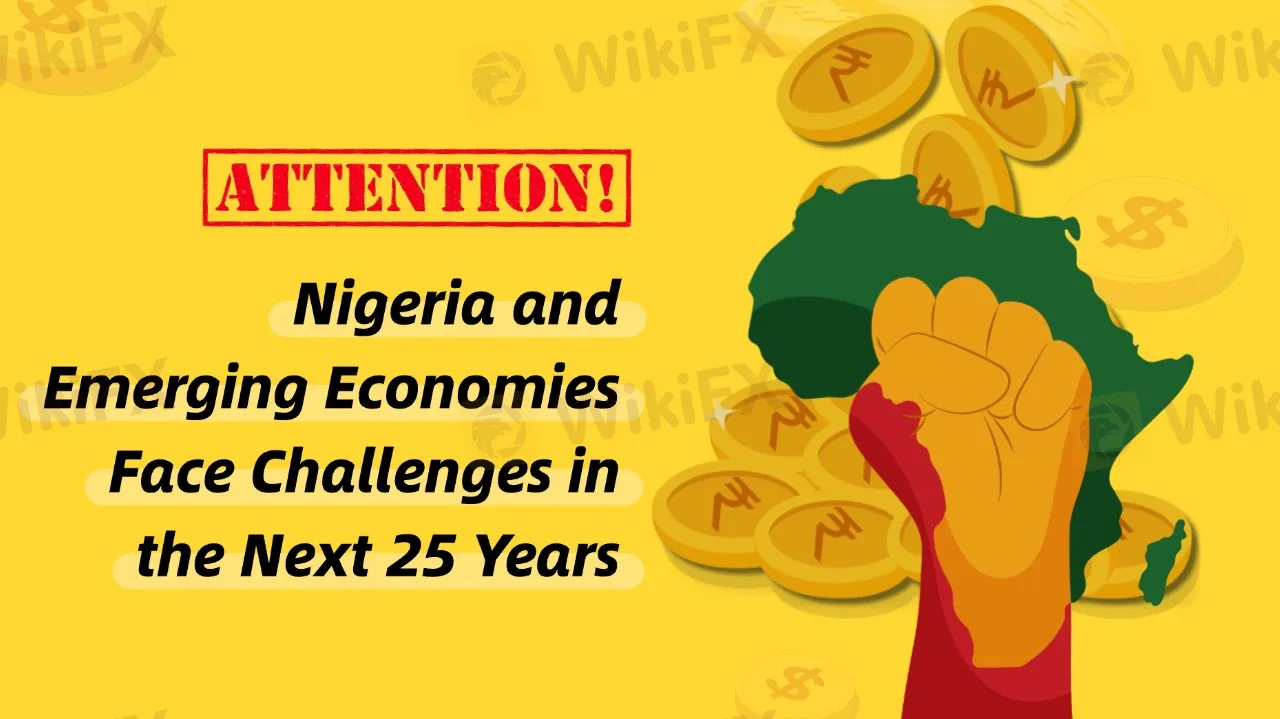简体中文
繁體中文
English
Pусский
日本語
ภาษาไทย
Tiếng Việt
Bahasa Indonesia
Español
हिन्दी
Filippiiniläinen
Français
Deutsch
Português
Türkçe
한국어
العربية
Nigeria and Emerging Economies Face Challenges in the Next 25 Years
Abstract:Nigeria continues to face significant challenges, including high debt, currency devaluation, and rising prices. On top of that, climate change-induced weather disasters and food security issues have made the economic outlook less optimistic.

Although Nigerias economy is expected to see a slight recovery in 2024, with growth potentially reaching 2.2%, this growth rate remains lower than that of other African countries. While increased oil production and improved power supply bring some good news, the country's broader economic situation remains fragile.
Globally, developing economies are becoming increasingly important. According to the World Bank, these countries now account for 45% of global GDP, up from just 25% in 2000. However, their growing importance comes with rising challenges. Many external forces that once supported their development are waning, and domestic reform processes have not kept pace. Meanwhile, developing economies continue to lag behind developed countries in terms of per capita income, income inequality, and productivity, leading to imbalances in both their social and economic systems.
Looking ahead, Nigeria and other developing economies face even more severe challenges in the next 25 years. These nations will continue to bear heavy debt burdens, with economic growth remaining sluggish. Moreover, the impact of climate change, such as extreme weather events and natural disasters, will put additional pressure on vital sectors like agriculture and energy. At the same time, slowing global investment and weak productivity will further hinder economic growth. With the population continuing to rise, providing more employment opportunities and improving living standards will be urgent issues to address.
To tackle these challenges, Nigeria and other developing countries will need to adopt new strategies. First, domestic economic structures must be reformed, particularly in tax and fiscal policies, to promote economic diversification. Increased investment in infrastructure, education, and technological innovation will also be critical to boosting private investment and productivity. Furthermore, developing economies should strengthen trade and investment partnerships with other nations, establish strategic alliances, broaden markets, and reduce trade barriers to enhance their competitiveness. Finally, responding flexibly to global economic uncertainties and implementing sound macroeconomic policies will be crucial to maintaining stability and achieving sustainable growth.
In conclusion, despite the significant challenges faced by Nigeria and other developing economies, with timely policy adjustments, innovation, and international cooperation, there is still a chance to achieve economic growth and sustainability in the next 25 years.

Disclaimer:
The views in this article only represent the author's personal views, and do not constitute investment advice on this platform. This platform does not guarantee the accuracy, completeness and timeliness of the information in the article, and will not be liable for any loss caused by the use of or reliance on the information in the article.
Read more

5 Risks associated with Grand Capital
You can avoid fraud, crypto scams, and similar traps simply by staying informed. If you regularly follow forex news, there’s a lower chance that you’ll fall victim to such scams. Being aware is the only way to stay safe. That’s why you also need to know about the Grand Capital broker and why it should avoided.

Avoid Trendify: 5 Red Flags Revealed
Trendify is nothing more than a scam broker. It is one of those forex brokers that acts genuine but is actually full of red flags. Before you invest and fall victim to its investment scam, its better to check out the risks involved with Trendify.

10 Unlicensed Brokers Exposed – Check Now to Stay Safe!
Traders need to stay informed, as scam brokers are active in the forex market. It's a basic rule for forex beginners to stay updated and check the Warning List. Here is the Warning List of unauthorized brokers you should avoid.

ThinkMarkets Unlocks More Weekend Crypto Trading Time
ThinkMarkets enhances crypto trading with significantly reduced weekend maintenance, offering traders greater access and an improved experience.
WikiFX Broker
Latest News
Forex Hedging: Is It a Trader’s Safety Net or Just an Illusion?
OPEC+ members agree larger-than-expected oil production hike in August
FCA clarifies expectations on bullying, harassment and violence to deepen trust in financial service
Asia-Pacific markets mixed after Trump shifts goalposts on tariffs again
XS.com Expands Global Reach with Landmark Kuwait Launch
European markets set to open mixed amid fresh U.S. tariff threats
Top Wall Street analysts are pounding the table on these 3 stocks
Stock futures fall after Trump team says tariffs will go into effect on Aug. 1: Live updates
10 Unlicensed Brokers Exposed – Check Now to Stay Safe!
S&P 500 futures fall slightly as Trump threatens new tariffs, Tesla shares drop: Live updates
Currency Calculator


